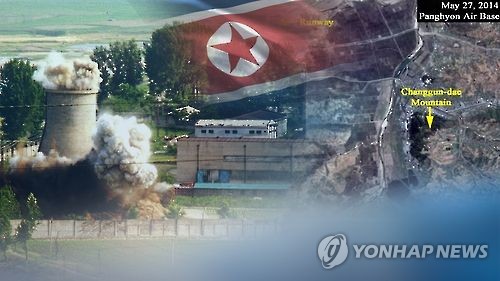Senior Analyst Eberstadt of the AEI testifies at Senate hearing
The United States should give up on any last-remaining hope that engagement with North Korea could lead to its denuclearization, a U.S. expert told a Senate hearing Tuesday, calling for all-round pressure on Pyongyang to rethink its nuclear pursuit.
Nicholas Eberstadt, a senior analyst at the American Enterprise Institute, made the remark during the Senate Foreign Relations Committee hearing, as some experts have stepped up calls for reopening negotiations with Pyongyang to curb its dangerously accelerating nuclear and missile programs.
"At this juncture, as so often in the past, serious people around the world are calling to 'bring North Korea back to the table' to try to settle the DPRK nuclear issue. However, seeing the DPRK for what it is, rather than what we would like it to be, should oblige us to recognize two highly unpleasant truths," Eberstadt said.
"First, the real existing North Korean leadership will never willingly give up their nuclear option. Never. Acquiescing in denuclearization would be tantamount to abandoning the sacred mission of Korean unification: which is to say, disavowing the DPRK's raison d'etre," he said.
Therefore, submitting to foreign demands to give up its nuclear weapons could well mean more than humiliation and disgrace for North Korean leadership, and would mean delegitimization and destabilization for the regime as well, the expert said.
"Second, international entreaties —- summitry, conferencing, bargaining, and all the rest —- can never succeed in convincing the DPRK to relinquish its nuclear program. Sovereign governments simply do not trade away their vital national interests," he said.
Past nuclear deals with Pyongyang brought about U.S. concessions, such as energy shipments and removal of the North from the terrorism sponsor list, but the "one thing 'engagement' can never produce, however, is North Korean denuclearization," he said.
Eberstadt also said that the notion of a "grand bargain" with Pyongyang, in which all mutual concerns are simultaneously settled, is "nothing but a dream."
The expert said the U.S. should adopt a "threat reduction" approach to the problem, including significantly bolstering defenses against the North, such as deployment of the THAAD missile defense system in South Korea and Japan and beefing up the U.S. missile defense systems.
He also called for sharply ramping up pressure on the North, including bringing an end to South Korea's "subsidized trade" with the North, putting the North back on to the U.S. list of states sponsoring terrorism, and enforcing genuinely biting sanctions.
China should be forced to pay a penalty for all its support for the North, Eberstadt said.

Scott Snyder, chief Korea analyst at the Council on Foreign Relations, also told the Senate hearing that the window of opportunity to achieve North Korea's peaceful denuclearization may have closed, as the North's leader clings to the nuclear program as an internal justification for his rule.
"North Korea has decided, based on lessons from Iran, Iraq and Libya, that it must be too nuclear to fail," he said.
Snyder also said the North "lives in the space created by Sino-U.S. geostrategic mistrust," and called for the U.S. to impose "secondary sanctions" on Chinese entities that trade with the North.
He also suggested that the new administration appoint a senior envoy for North Korea who reports directly to the president as a way of signaling the urgency of the North Korea issue.
Snyder said the administration of U.S. President Donald Trump must maintain close cooperation with South Korea, despite the leadership crisis in the Asian ally, and establish "strong coordination mechanisms" between the leaders of the two countries to manage and lead a joint political response to any North Korean contingencies.
He said that a new president of the South could be interested in reopening dialogue channels with the North, but Seoul should make sure that the U.S. and the South are on the same page in advance of a renewed diplomatic initiative to engage the North.
In addition, Seoul should adhere to U.N. sanctions restricting economic cooperation with North Korea until the country returns to the path of denuclearization, he said. (Yonhap)

